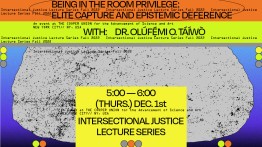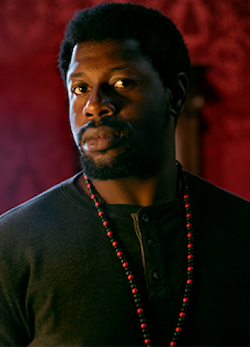Being in the Room Privilege: Elite Capture and Epistemic Deference
Thursday, December 1, 2022, 5 - 6pm

The call to “listen to the most affected” or “centre the most marginalized” is ubiquitous in many academic and activist circles. But from a societal standpoint, the “most affected” by the social injustices we associate with politically important identities like gender, class, race, and nationality are disproportionately likely to be incarcerated, underemployed, or part of the 44 percent of the world’s population without internet access – and thus both left out of the rooms of power and largely ignored by the people in the rooms of power. Individuals who make it past the various social selection pressures that filter out those social identities associated with these negative outcomes are most likely to be in the room. Olúfẹ́mi O. Táíwò's talk - part of an online lecture series around the theme of intersectional justice - will discuss problems that these pressures raise for organizing at different scales, and try out some thoughts about possible routes of response.
Olúfẹ́mi O. Táíwò is associate professor of philosophy at Georgetown University. His work focuses on Africana and social/political philosophy and emphasizes themes and figures from anti-capitalist, anti-colonial, and Black radical traditions of thought and practice. He is also the author of Reconsidering Reparations (Oxford University Press, January 2022) and Elite Capture (Haymarket Press and Pluto Press, May 2022).
This series is co-organized by the Office of Student Affairs and Nada Ayad, Associate Dean of HSS, as a continuation of a reading and discussion series for first-year students that was held as part of the Fall 2020 new student orientation. In the spirit of The Cooper Union mission, the Black Student Union and the Cooper Climate Coalition, along with several other Cooper students and faculty, were deeply involved in the articulation of the program as well as in contributing to the reading list and suggesting speakers.





